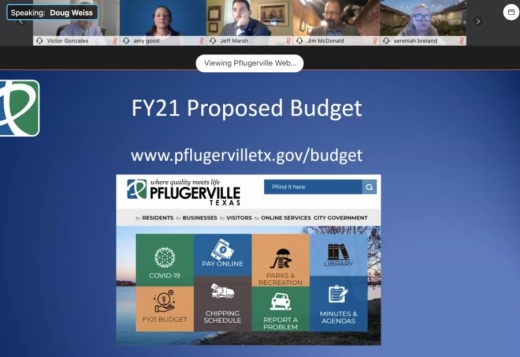The cuts came alongside council’s decision to lower its maximum tax rate, which is now set at $0.4863 per $100 valuation. The maximum rate is not necessarily the rate that will be adopted by council, but rather is the highest rate the city can consider for FY 2020-21 without restarting the budget adoption process.
The new budget proposal varies from what was initially proposed to council by city staff in July. Under the July draft, the city proposed a $216.6 million budget and a property tax rate of $0.497 per $100 valuation. The original tax rate considered was based on a 7.05% increase in operating revenue.
The city’s July rate proposal of $0.497 per $100 valuation represents a decrease over the property tax rate adopted in September 2019. However, the proposed rate represents a $0.0025 increase above the estimated No New Revenue Tax Rate. The No New Revenue Tax Rate, listed at $0.4945 per $100 valuation, generates the same property tax revenue as the prior year based on the new year’s total value of taxable property, as defined by state law.
At issue
Prior to council’s amended budget and tax rate proposals, a dozen residents spoke against Pflugeville’s initial proposed property tax rate on Aug. 11. Many speakers called into question the city’s consideration of raising its operating revenue 7.05%, a higher amount than the 3.5% revenue cap established by Senate Bill 2.
Senate Bill 2 was signed into law by Gov. Greg Abbott in June 2019 and limited how much a city or county can increase property tax revenue to 3.5% from the previous year before voter approval is required. The law formally went into effect Jan. 1.
Part of the law pertains to disaster declarations, which would allow a city council to calculate the voter-approved tax rate at an 8% revenue increase “if any part of the city is located in an area declared a disaster area during the current tax year by the governor or by the president of the United States.” As part of its budget proposal, Pflugerville city staff proposed the 7.05% increase in operating revenue, citing the coronavirus pandemic and its subsequent disaster declaration.
However, several residents who spoke Aug. 11 said the law’s disaster declaration was created for natural disasters, not health crises. Resident Anthony Nguyen said the spirit of the law’s exemption came in the aftermath of Hurricane Harvey, adding an increase above 3.5% is not sustainable for residents.
Dennis Warren, a Pflugerville resident, said that while the city’s use of the disaster exemption might technically be legal, it is not the moral decision to pursue. Warren pointed to the city’s heightened sales tax collections from the spring as well as its total debt, which he referred to as “unsustainable.”
Weighing the options
At a July 28 meeting, Council Member Rudy Metayer said he had “serious concerns” about a tax rate increase larger than 3.5%, specifically addressing potential "retroactive actions" enacted by the Texas Legislature when it resumes in January.
Council Member Mike Heath said on Aug. 11 that council should move in the direction of a 3.5% increase as its maximum rate, and cut portions of the city’s budget to alleviate taxpayer burden. Heath suggested the city cut its transportation pilot program, the police department’s shooting range replacement and city merit raises from the budget.
Metayer added on Aug. 11 that, based on the city’s increased fund balance, the city should consider dipping into those resources to cover city services before considering the proposed rate. Fund balances can offer a rainy day fund for city operations, and given the pandemic, Metayer said it would make sense to utilize some of those funds.
Pflugerville currently operates a 45% fund balance. By charter, the city is required to maintain a minimum of 25% in reserves.
However, some council members were not in favor of dipping into the city’s excess funds. Council Members Doug Weiss and Jim McDonald said the balance is an emergency reserve, with Weiss adding it should not be used for operating expenses unless absolutely necessary.
“Fund balance transfers are counterproductive to the health of the city,” Weiss said.
Council approved the removal of the city’s $150,000 parks master plan and the police department’s $100,000 firing range replacement from the budget. Council also directed the city to increase sales tax revenue projections by $200,000 and use $200,000 from its fund balance to meet its desired maximum rate of $0.4863 per $100 valuation.
Next steps
The budget proposal presented Aug. 11 marks a $25.49 million, 13% increase over the city’s $190.8 million FY 2019-20 budget.
The average Pflugerville home value is now listed at $258,167, up from $254,485 last year, per city documents. If adopted, the maximum rate of $0.4863 per $100 valuation would result in an estimated average city tax bill of $1,255.47, city officials confirmed Aug. 12. Under the current FY 2019-20 property tax rate, the average city tax bill is approximately $1,281.64.
Pflugerville City Council will host a public hearing on the tax rate and adopt its FY 2020-21 budget on Aug. 25.





